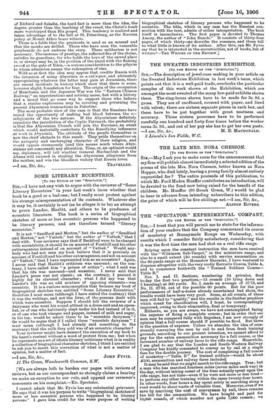SOME LITERARY ECCENTRICS.
[TO THE EDITOR OP THE "SPECTATOR."]
STR,—I have not any wish to argue with the reviewer of "Some Literary Eccentrics " in your last week's issue whether that book be a good or a bad one ; but I really must protest against his strange misrepresentation of its contents. Whatever else it may be, it certainly is not (as he alleges it to be) an attempt to prove Lander, Hazlitt, and others to be producers of eccentric literature. The book is a series of biographical sketches of more or less eccentric persons who happened to be literary persons, and are therefore termed "literary eccentrics."
It is not " Sandford and Merton," but the author of "-Sandford and Merton," not " Vathek' but the author of " Vathek," that I deal with. Your reviewer says that if Beckford were to be charged with eccentricity, it should be on account of Fonthill and his other extravagances instead of on account of " Vathek." Would any- body who had not seen my book believe that it is precisely on account of Fonthill and his other extravagances, and not on account of " Vathek," that I have represented him as an eccentric ? Again, I never said that Hazlitt's criticism was unsound ; on the con- trary, I have called him " a prince of critics "; what I said was that his life was unsound—and eccentric. I never said that Landor's prose was not classic; on the contrary, I praised it highly for its classical character ; what I did say was that Landor's life was an odd mixture of opposing elements—was eccentric. It is a curious misconception that because my book of biographical sketches was entitled " Some Literary Eccentrics," therefore I must mean (although I have stated the contrary) that it was the writings, and not the lives, of the persons dealt with which were eccentric. Suppose I should tell the reviewer of a dairyman who went his round attired in a dress-suit and an opera-
hat, or of one who habitually slept under his bed instead of in it, or of one who took vinegar and pepper, instead of milk and sugar,
in his tea: would he admit these to be " eccentric dairymen"? Or would he argue that if I called them "eccentric dairymen" I must mean (although I had already said something to the contrary) that the milk they sold was of an eccentric character?
Your reviewer might have damned the execution of my book to his heart's content without a word of protest from me; but when he represents as a set of idiotic literary criticisms what is in reality a collection of biographical character sketches, I think I am entitled to ask you to insert this correction of what is not a matter of opinion, but a matter of fact.
11 The Grove, Wandsworth Common, S.W.
[We are always loth to burden our pages with reviews of reviews, but as our correspondent so strongly claims a hearing we make an exception to our rule, and append our reviewer's comments on his complaint.—En. Spectator.
I cannot admit that Mr. Fyvie has any substantial grievance. He says that it was his purpose to write "biographical sketches of more or less eccentric persons who happened to be literary persons." I gave him credit for the wiser purpose of writing biographical sketches of literary persons who happened to be eccentric. The title, which in any case has the flimsiest con- nection with the text, admits of either interpretation. The book itself is inconclusive. The first paper is devoted to Thomas Amory, the author of "John Buncle." It consists of thirty-four pages, of which thirty-one describe the romance, and three tell ' us what little is known of its author. After this, can Mr. Fyvie say that he is interested in the eccentricities, not of books, but of writers P—THE WHITER OF THE REVIEW.]










































 Previous page
Previous page